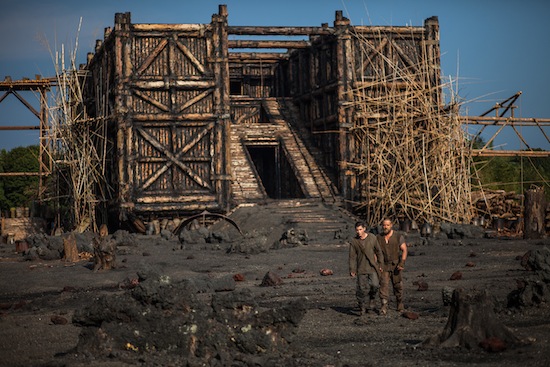Russel Crowe is Noah in Darren Aronofsky’s latest film. (photo from Paramount Pictures)
An earnest amalgam of free-association Bible story, dire disaster movie and family melodrama, Noah is a more thoughtful and provocative movie than one has any right to expect. Sure, it’s ludicrous and ponderous at times and embellished with gratuitous special effects, but it also succeeds in prodding the viewer to reflect on his or her behavior toward others and relationship to God.
Darren Aronofsky, a Brooklyn Jew by birth and upbringing, has concocted a sporadically inspired film with enough fodder for a month of sermons. It’s a compelling saga up until the great flood, when key plot elements collide with enough force and absurdity to sink an ark. Metaphorically speaking, that is. After all, the species (plural) must go on.
In terms of contemporary resonance and relevance, the film’s depiction of religious absolutism pushed to the point of tyrannical self-righteousness – in the name of God, of course – neatly undercuts the inclination by zealots of any faith to claim Noah as gospel.
I remember Noah as a mild-mannered super-carpenter and reluctant zoologist in my Hebrew school classes of yore, but you don’t cast Russell Crowe to play a guy grappling with internal and existential dilemmas. His Noah is a decisive survivalist who doesn’t hesitate to kill to protect his family or to fulfil God’s plan.
Aronofsky’s Noah can only infer and deduce that plan from the occasional wondrous sign or disturbing dream, aided by his sage, Merlin-esque grandfather, Methuselah (Anthony Hopkins). Aronofsky and co-writer Ari Handel resist the temptation – and the arrogance – of having God speak directly to Noah.
We have no doubt, though, that Noah is the last true believer in the Creator, as the Lord is referred to throughout the picture. Indeed, he has a real talent for channeling God’s merciless fury. In this regard, Noah is reminiscent of Moses, who was up to the task of meting out vengeance – or justice, in the vernacular of the film – when the time came.
That association aside, Aronofsky’s most Jewish picture remains his mystical black-and-white debut, Pi, in which Handel has a cameo as a kabbalah scholar. It is much more difficult to discern a Jewish sensibility in Noah than it was (to summon another biblical adaptation) to detect Mel Gibson’s deep-seated antisemitism in The Passion of the Christ.

The most jarring element in Noah from a Jewish perspective is the presence of angels, called “Watchers” and manifested as angry, hulking, walking, talking rock piles. Punished by God for trying to intervene on behalf of Adam and Eve, the Watchers decide to help Noah – and, by extension, serve their Creator – build the ark and then repel the hordes who desperately attempt to board when the hard rain starts a-fallin’.
At a crucial moment, the Watchers are redeemed for their sacrifice and return to the heavens like Roman candles. Polls report that a majority of Americans believe in angels, so for some viewers this sequence will mark the emotional high point of the movie.
Amid the concessions to visual effects-driven miracles, Noah manages to convey the nasty, brutish world of the Bible. At the same time, it demolishes Noah’s cloak of absolute good to demonstrate that no person is devoid of flaws and fallibility.
The film does not, alas, evoke the strength and power of the Bible’s matriarchs, for its female characters – Noah’s wife Naameh (Jennifer Connelly) and a young girl (Emma Watson) saved and raised by the family who grows up to be Shem’s love interest – are given little to do in the second half except cry, shriek and sob.
The biggest obstacle to a visual rendering of Noah’s mythic saga, though, is that we know how the reboot of civilization turned out. We’re living it. So the optimistic rainbow at the end of Noah has all the credibility and gravitas of a Hallmark commercial.
Whether we see the modern world as the inevitable manifestation of human nature in all its glories and depravities or as a technologically supercharged Sodom, Noah makes us ponder the fate of the world as a function of our interdependence as well as our individual morality. Should we fear God’s anger and another flood, or (as the movie hints) is a self-inflicted die-off from environmental destruction just as likely? Either way, Noah represents a powerful admonition to humankind.
What’s intriguing about a repeat apocalypse is that it would be a communication from a God who’s been silent for centuries. The power of Noah, one could say, is to remind us that every cloud has a silver lining.
Michael Fox is a writer and film critic living in San Francisco.

